
ANTONIOS DANIIL Architecture Portfolio 2024

Name:
Surname:
Date of birth:
Nationality:
Antonios Daniil 11.01.1999 Greece
About Me
Constantly intrigued by cities and the complexity of the world surrounding us. Intensly curious, I see design as adapting knowledge and experience to produce creative solutions
2020-2024
EXPERIENCE
Master of Architecture, Architecture and Urban Design Politecnico di Milano
2022-23
2022
2019
2017-2020
Architectural Traineeship Herzog & de Meuron, Munich
Project in the chair of Sustainable Urbanism Exchange semester in TUM
Architectural Internship Arcipelago Architetti, Milano
Bachelor of Architecture Politecnico di Milano
SKILLS
Autocad Archicad/BIM
Adobe Photoshop
Adobe InDesign
Adobe Illustrator
Rhinoceros
Sketchup
MS Office Suite
GIS
Greek
Native Proficiency
English Native/Bilingual Proficiency
Cambridge CPE C2
Italian Limited Working Proficiency
German
Elementary Proficiency
Goethe-Zertifikat B1 (2017)
2
LANGUAGE
Contact Information +39 331 956 73 41 +30 694 590 32 92
nis-daniil-147672165
http://linkedin.com/in/anto-
LinkedIn Phone
antonis.daniil@outlook.com E-mail
INDEX
Dense Housing | Yazd, Iran
p.4 - 11
Multimaterial Tower | Nagoya, Japan
p.12 - 17
Elementum | Munich, Germany
p.18 - 21
University Stage | Milan
p.22 - 27
New Communities for the Old | Salemi,Sicily
p.28 - 35
Diffused Connections | Villa Panza, Varese
p.36 - 41
3


Dense Housing
Yazd,Iran | 2021
Class: Architecture Design Studio
Professors: Bovati Marco, Afshari Arian Heidari
Collaborators: Karlovich Julia, Marchi Chiara, Martinelli Anita, Pepanyan Mary
The project task was to create an urban masterplan comprised of public facilities and dense economical housing in the city of Yazd in Iran. The requirements for efficient density as well as the climatic conditions of Yazd made it a project requiring a lot of analysis. The final result is a complex based on initial housing modules that maximised the space to achieve economical efficiency and affordability. These modules were paired to create modular clusters that guided us in creating a dense structure based on alignments of the neighbouring historical garden. While the structures are modern in their form they incorporate many local materials as well as shading techniques to make them withstand the local heat.
The rest of the complex incorporates a public bazaar avenue as well as a cultural centre with art spaces and a library. Extra care was put in the material consistency of the project. With opaque elements being used as much as possible, while also incorporating local bricks.
Ultimately the goal of achieving a dense district that respects the local planning environment and heritage, was achieved thanks to an early grid and modular approach, that became more complex as the project was furthered developed






1. Designing the housing
2. Creating linear or
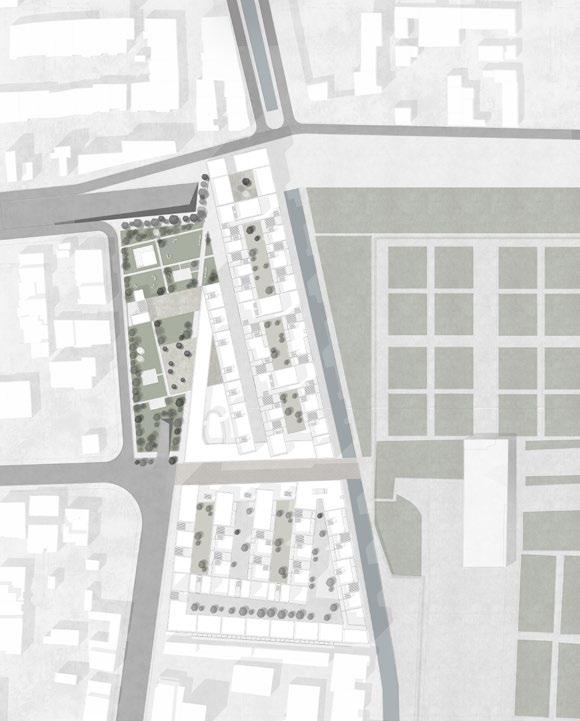
3. Forming the dense

6 = 66 sq.m. active area passive area movements wet core 15 11 6.5 14 7 7.5 MATURE 3 2 0.30 0.30 0.30 3.45 0.12 0.38 2.15 3.45 0.30 3.45 0 10 25 50 m Sun incidence at 12AM 81° 58° June solstice March-September equinox December solstice NORTH SOUTH NORTH SOUTH Built-Up Space Analysis Traditional District Transitional District Modern District Street Grid Analysis 1.9 2.5 5.1 2.4 8.1 2.4 17.1 3.5 31.1 7.2 2.7 2.5 5.1 1.5 8.0
Urban analysis & Strategy
process & Masterplan Urban Scale Approach Sun incidence at 12pm Site borders Forming pathways according to the grid Elevating the sides facing away from the old garden Main pathway leading to garden and massing Forming the public areas Carving views for air and facing the gardens
Massing
Architecture scale approach
approach
housing units
corner apartments layouts
dense residential clusters

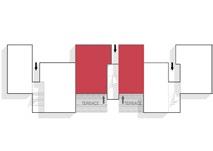

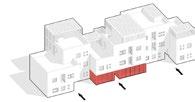

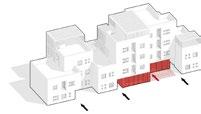






7 = 47 sq.m. active area passive area movements wet core 15 10 4 12 3 = 70 sq.m. active area passive area movements wet core 14 18 7 14 8 9 3 MATURE COUPLE 66 s.q.m. 1.35 0.30 3.80 5.9 0.30 0 1 2 m 12.7 2.4 4.9 5.0 2.4 6.5 2.5 1.9 8.0 66.3 11.8 4.3 4.8 5.1 1.5 7.4 2.5 2.7 7.2 8.1 2.4 17.1 3.5 0.00 YOUNG COUPLE WITH A BABY 65 s.q.m. 0 1 2 m +6.00 active area passive area movements wet core = 45 sq.m. 20 5 5 15 <35 YEARS OLD 45 s.q.m. 4.45 0.30 0.30 0.30 4.00 0.12 0.38 3.00 0.30 1.90 0.30 0.30 4.45 0 1 2 m Distribution of public facilities on the ground floor (-1.5) General view Differentiation of levels for creation of hierarchy of different outer spaces
for attachments Staircase outside Creation of semi public spaces with help of terraces
Surfaces
Small space ground floor flexibility Corner attachment
Larger space ground floor flexibility
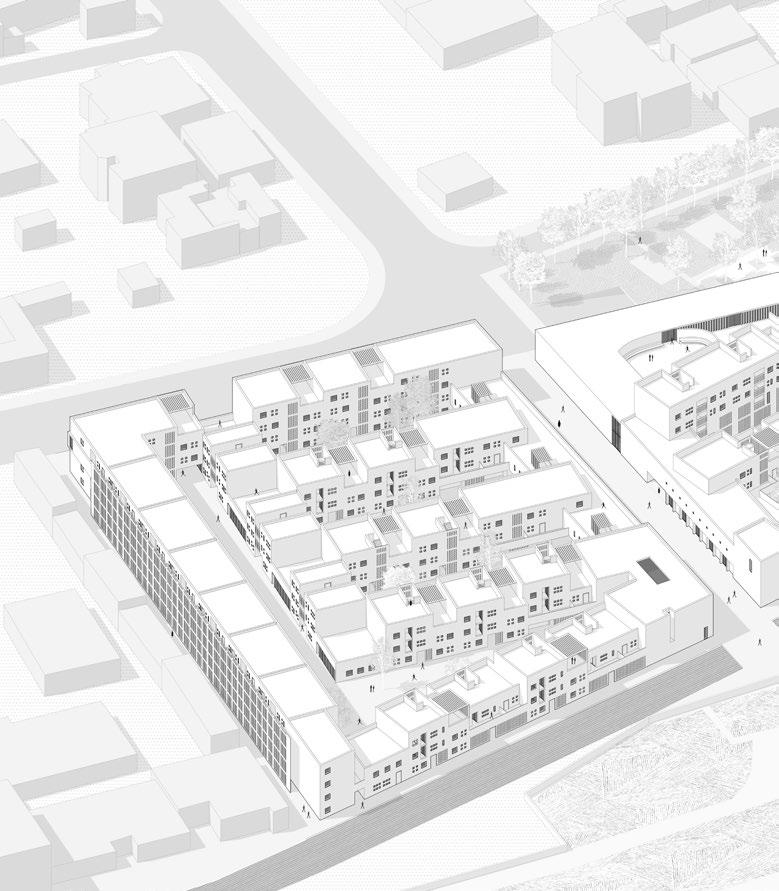

8


9
10 GROUND FLOOR 1:500 ARCHITECTURAL DESIGN STUDIO A.A. 2020-21 Marco Bovati, Arian Heidari Afshari, Mauro Nicoletti
GROUP 1 | Antonios Daniil, Julia Karlovich, Chiara Marchi, Anita Martinelli , Meri Pepanyan





11 LIBRARY LIBRARY WORKSHOP WORKSHOP WORKSHOP LOUNGE THEATRE EXHIBITION EXHIBITION EXHIBITION A B’ A’ B
Section A-A’
Section B-B’
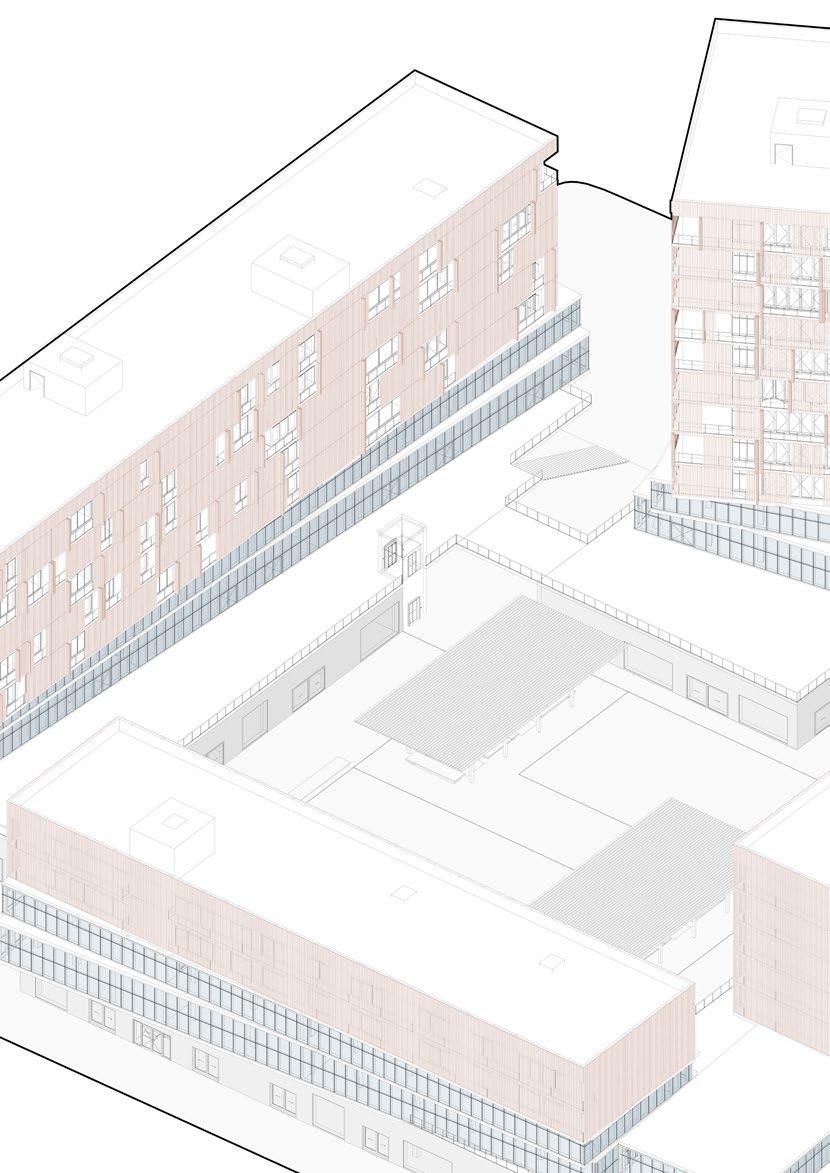

Multimaterial Tower
Nagoya, Japan | 2020-2021
Class: Construction and Sustainability Design Studio
Professors: Fabris Luca Maria, Adhikari Rajendra Singh
Collaborators: Bajrami Florent, Kostadinova Marija
The task of the project was redeveloping an urban block in the city of Nagoya in Japan. The site is in the dense grid-patterned centre of the city, on a plot previously occupied by a mall. The aim was to achieve a zero energy building, that would comprise of residential units, as well as offices and commercial spaces.
Originating from this multifunctional program we decided to create a scheme that would highlight these different functions in its materiality. This would allow us to be flexible in shaping the plot according to the solar and wind analysis, as well as fitting keeping a block structure on the ground floor in accordance with the city structure.
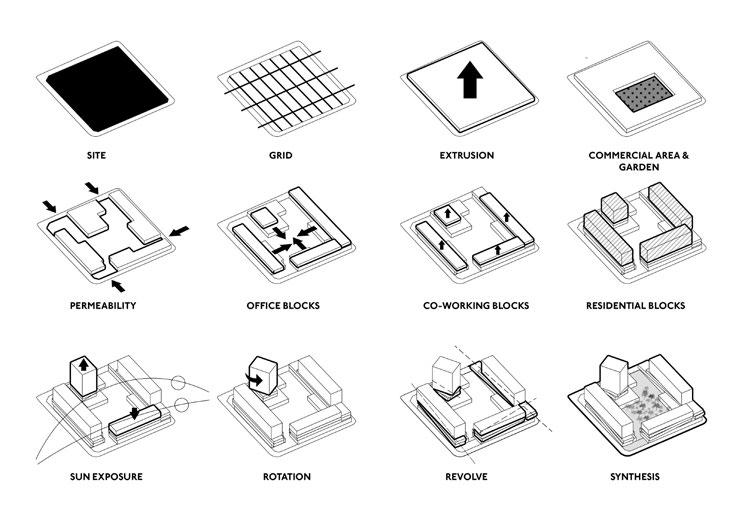
CONSTRUCTION AND SUSTAINABILITY DESIGN STUDIO | Fabris Luca Maria Francesco - Adhikari Rajendra Singh | Group 16 - Bajrami Florent, Daniil Antonios, Kostadinova Marija
CONCEPT & DIAGRAMS
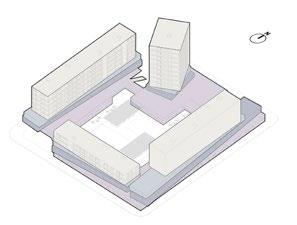
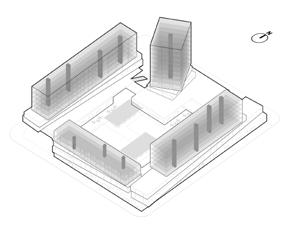
CONSTRUCTION
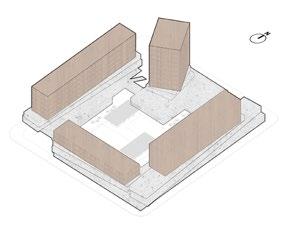
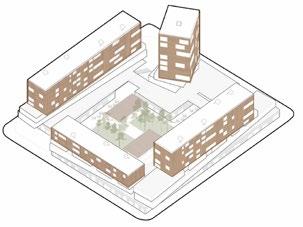
14
CONCEPT & DIAGRAMS
|
Marija
AND SUSTAINABILITY DESIGN STUDIO | Fabris Luca Maria Francesco - Adhikari Rajendra Singh
Group 16 - Bajrami Florent, Daniil Antonios, Kostadinova
Functional Distribution Circulation Diagram Construction Materials Master Axonometric
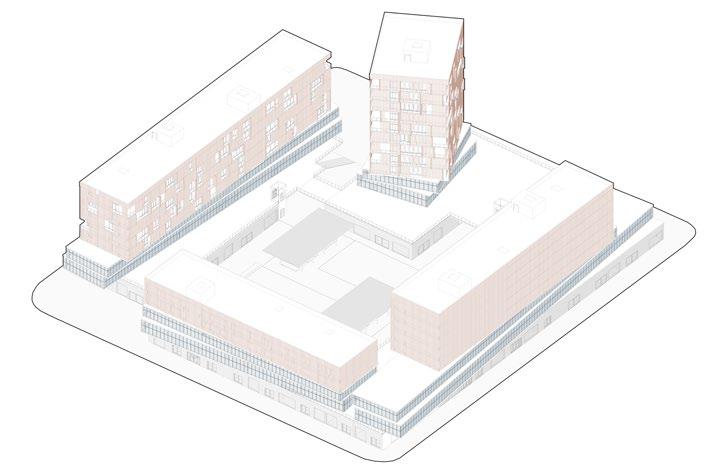
15
FACADE 1:200 Typical Apartment Floor Office Floor Ground-Commercial Floor
FACADE 1:200
16 1 2 3 4 5 1 5 6 12 4 7 11 DETAIL 1 - ROOF DETAIL 2 - APARTMENT FLOOR DETAIL 3 - CO-WORKING SPACE CEILING 1 5 6 12 4 7 11 DETAIL 1 - ROOF DETAIL 2 - APARTMENT FLOOR DETAIL 3 - CO-WORKING SPACE CEILING 1 5 6 12 4 7 11 DETAIL 1 - ROOF DETAIL 2 - APARTMENT FLOOR DETAIL 3 - CO-WORKING SPACE CEILING 1 5 6 12 16 2 3 4 7 10 9 8 15 DETAIL 1 - ROOF DETAIL 4 - OFFICE FLOOR DETAIL 5 - FOUNDATION DETAIL 2 - APARTMENT FLOOR 1 5 6 12 16 2 3 4 7 10 9 8 15 DETAIL 1 - ROOF DETAIL 4 - OFFICE FLOOR DETAIL 5 - FOUNDATION DETAIL 2 - APARTMENT FLOOR Detailed Section
DETAIL 1 - ROOF
30 mm cover matt
5 mm bituminous membrane
80 mm EPS insulation
50-100 mm battens to falls, 2° slope
190 mm CLT slab
100 mm suspended ceiling
20 mm timber finish
2 mm bituminous membrane
155 CLT parapet
2 mm bituminous membrane
30 x 80 mm timber shutters
DETAIL 4 - OFFICE FLOOR
2 x 6 mm glazing + 12 mm argon filled gap low-e coating on the inner glazing
DETAIL 2 - APARTMENT FLOOR
20 mm parquet finishing | 40 mm screed
50 mm EPS insulation | 180 mm CLT slab
10 mm finishing layer | 100 mm suspended ceiling
20 mm tile finishing | 2 mm bituminous membrane
50 - 25 mm EPS insulation to falls, 2° slope
180 mm CLT slab | 10 mm finishing layer
heating pipe floor groove
20 mm tempered glass railing
shutter hinge
C-profile shutter rail
DETAIL 5 - FOUNDATION
DETAIL 3 - CO-WORKING SPACE CEILING SUPERSLAB
20 mm parquet finishing
40 mm screed
50 mm EPS insulation
500 mm waffle system reinforced concrete slab
20 mm tile finishing
80 - 70 mm screed to falls, 2° slope
55 mm EPS insulation
140 reinforced concrete slab
thermal bridge blocker
3 x 5 mm glazing + 2 x 6 mm argon filled gap low-e coating on the inner glazing
DETAIL 4 - OFFICE FLOOR
20 mm tile finishing
80 - 70 mm screed to falls, 2° slope
55 mm EPS insulation
140 reinforced concrete slab
550 mm suspended ceiling
DETAIL 5 - FOUNDATION
20 mm tile finishing 100 mm screed
115 mm EPS insulation
80 mm concrete slab
iglu ventilated cavity
500 reinforced conrete slab
870 mm gravel fill
5 mm bituminous membrane
200 mm laying concrete
100 mm exposed concrete
150 mm EPS insulation
100 mm concrete
15 mm finishing layer
17 10 50 100 200 cm 12 16 2 3 10 9 8 13 14 15 17 30 mm cover matt 5 mm bituminous membrane 80 mm EPS insulation 50-100 mm battens to falls, 2° slope 190 mm CLT slab 100 mm suspended ceiling 20 mm timber finish 2 mm bituminous membrane 155 CLT parapet 2 mm bituminous membrane 1 11 12 13 14 15 16 17 2 3 4 5 6 7 8 9 10 2 x 6 mm glazing + 12 mm argon filled gap low-e coating on the inner glazing 30 x 80 mm timber shutters 20 mm parquet finishing 40 mm screed 50 mm EPS insulation 180 mm CLT slab 10 mm finishing layer 100 mm suspended ceiling 20 mm parquet finishing 40 mm screed 50 mm EPS insulation 500 mm waffle system reinforced concrete slab 20 mm tile finishing 80 - 70 mm screed to falls, 2° slope 55 mm EPS insulation 140 reinforced concrete slab thermal bridge blocker 3 x 5 mm glazing + 2 x 6 mm argon filled gap low-e coating on the inner glazing 550 mm suspended ceiling 20 mm tile finishing 100 mm screed 115 mm EPS insulation 80 mm concrete slab iglu ventilated cavity 500 reinforced conrete slab 870 mm gravel fill 5 mm bituminous membrane 200 mm aying concrete 100 mm exposed concrete 150 mm EPS insulation 100 mm concrete 15 mm finishing layer 20 mm tile finishing 2 mm bituminous membrane 50 - 25 mm EPS insulation to falls, 2° slope 180 mm CLT slab 10 mm finishing layer heating pipe floor groove 20 mm tempered glass railing shutter hinge C-profile shutter rail DETAIL 4 - OFFICE FLOOR DETAIL 5 - FOUNDATION CEILING SUPERSLAB 10 50 100 200 cm 12 16 2 3 10 9 8 13 14 15 17 30 mm cover matt 5 mm bituminous membrane 80 mm EPS insulation 50-100 mm battens to falls, 2° slope 190 mm CLT slab 100 mm suspended ceiling 20 mm timber finish 2 mm bituminous membrane 155 CLT parapet 2 mm bituminous membrane 1 11 12 13 14 15 16 17 2 3 4 5 6 7 8 9 10 2 x 6 mm glazing + 12 mm argon filled gap low-e coating on the inner glazing 30 x 80 mm timber shutters 20 mm parquet finishing 40 mm screed 50 mm EPS insulation 180 mm CLT slab 10 mm finishing layer 100 mm suspended ceiling 20 mm parquet finishing 40 mm screed 50 mm EPS insulation 500 mm waffle system reinforced concrete slab 20 mm tile finishing 80 - 70 mm screed to falls, 2° slope 55 mm EPS insulation 140 reinforced concrete slab thermal bridge blocker 3 x 5 mm glazing + 2 x 6 mm argon filled gap low-e coating on the inner glazing 550 mm suspended ceiling 20 mm tile finishing 100 mm screed 115 mm EPS insulation 80 mm concrete slab iglu ventilated cavity 500 reinforced conrete slab 870 mm gravel fill 5 mm bituminous membrane 200 mm aying concrete 100 mm exposed concrete 150 mm EPS insulation 100 mm concrete 15 mm finishing layer 20 mm tile finishing 2 mm bituminous membrane 50 - 25 mm EPS insulation to falls, 2° slope 180 mm CLT slab 10 mm finishing layer heating pipe floor groove 20 mm tempered glass railing shutter hinge C-profile shutter rail DETAIL 4 - OFFICE FLOOR DETAIL 5 - FOUNDATION CEILING SUPERSLAB 10 50 100 200 cm 12 16 2 3 10 9 8 13 14 15 17 30 mm cover matt 5 mm bituminous membrane 80 mm EPS insulation 50-100 mm battens to falls, 2° slope 190 mm CLT slab 100 mm suspended ceiling 20 mm timber finish 2 mm bituminous membrane 155 CLT parapet 2 mm bituminous membrane 1 11 12 13 14 15 16 17 2 3 4 5 6 7 8 9 10 2 x 6 mm glazing + 12 mm argon filled gap low-e coating on the inner glazing 30 x 80 mm timber shutters 20 mm parquet finishing 40 mm screed 50 mm EPS insulation 180 mm CLT slab 10 mm finishing layer 100 mm suspended ceiling 20 mm parquet finishing 40 mm screed 50 mm EPS insulation 500 mm waffle system reinforced concrete slab 20 mm tile finishing 80 - 70 mm screed to falls, 2° slope 55 mm EPS insulation 140 reinforced concrete slab thermal bridge blocker 3 x 5 mm glazing + 2 x 6 mm argon filled gap low-e coating on the inner glazing 550 mm suspended ceiling 20 mm tile finishing 100 mm screed 115 mm EPS insulation 80 mm concrete slab iglu ventilated cavity 500 reinforced conrete slab 870 mm gravel fill 5 mm bituminous membrane 200 mm aying concrete 100 mm exposed concrete 150 mm EPS insulation 100 mm concrete 15 mm finishing layer 20 mm tile finishing 2 mm bituminous membrane 50 - 25 mm EPS insulation to falls, 2° slope 180 mm CLT slab 10 mm finishing layer heating pipe floor groove
mm tempered glass railing shutter hinge C-profile shutter rail
20
CEILING SUPERSLAB
17
17
1 5 2 6 3 7 4 8 9 10 11 16 12 12 17 13 14 15 Detailed Elevation
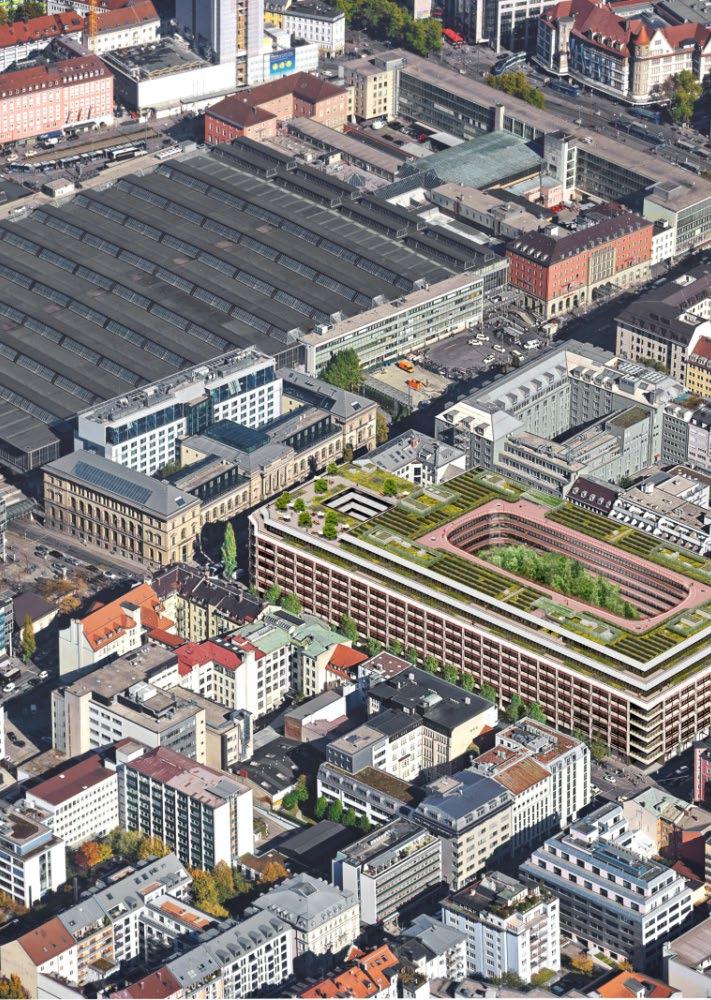

Munich, Germany | 2022-23 Elementum
Project contribution while working for Herzog & de Meuron
The project consists of the redevelopment of the now disused former offices of the German Post Office. The plan to rework an entire city block south of the Central station of Munich includes the partial demolition of the former offices and an adjacent hotel. By keeping the underground structure and part of the ground floor the block can be redeveloped with reduced construction and environmental costs, thus effectively making a comparatively sustainable project. The massive office space will be paired with a big semi-public courtyard in the center with a green core flanked by commercial spaces adding open space to a dense part of the city.
The personal contributions to the project include considerable 3D modelling and graphic studies and drafting work in the BIM model of the building. That included contributions in producing construction details for the construction phases. Additionally part of the private open space facilities on the top floor were studied and a floor plan prepared as part of the work.
For Confidentiality and copyright reasons only private images can be included in this portfolio
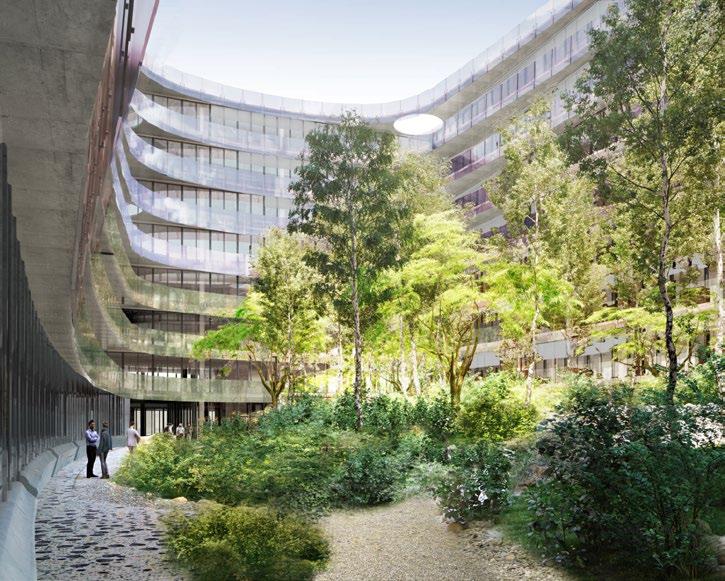

20
Inner Courtyard
Main Lobby into the Office Space
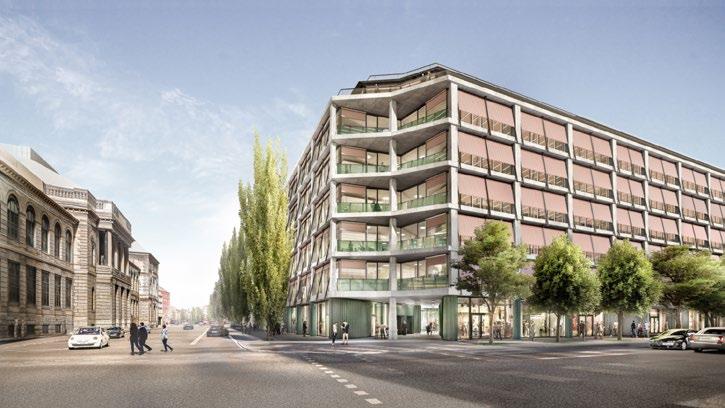
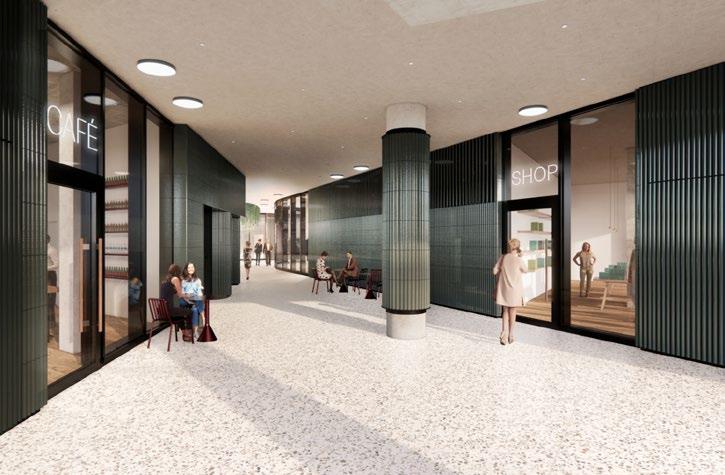
21
Northwest Passage into the courtyard
View from the street surrounding the railway station


University Stage
Bovisa, Milan | 2020
Class: Final Design Workshop
Professors: Faroldi Emilio, Vettori Maria Pilar, Scrivano Paolo
Collaborators: Merk Günter, Shturma Anton
Our project area is located in the former industrial district of Milan - Bovisa. Nowadays, it is abandoned. Nevertheless, the main particularities are a dose location to the Campus of Politecnico di Milano and a strong industrial presence in architectural style
We decided to pay attention to both factors and introduce a multifunctional area for leisure time and work.
Since the beginning, it was decided on the concept of “Stage”, where open area serves as a sitting area and buildings work as performance spaces.
To emphasize the feeling of the ‘journey through different stages” it was decided to connect all of the interventions by the 1st-floor pathway. In that way, big volumes for ballet, choir, and the stage could occupy the whole ground floor. At the same time, the upper area was designed according to different functions and “atmospheres”.
In that way, even a new person could be a viewer from the outside or take part in the act inside of our building.
24
Process
Diagrams and Function Scheme
25 Masterplan
26 N N
Floor Plan
Floor Plan
Ground
First
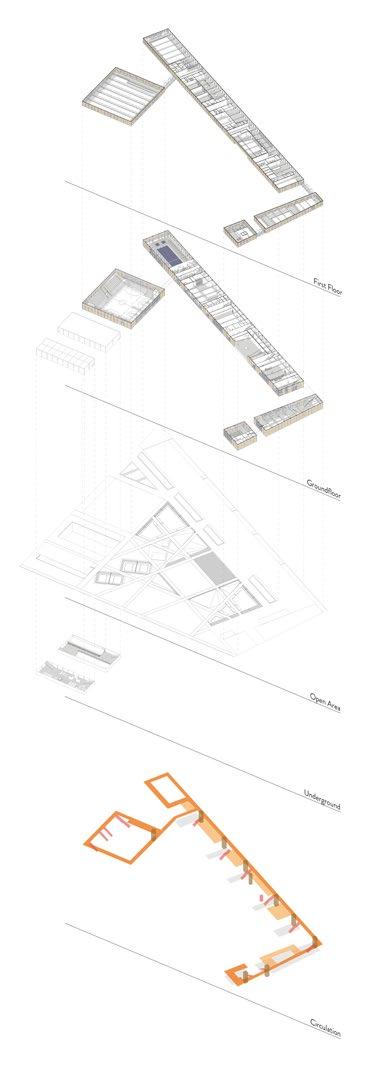

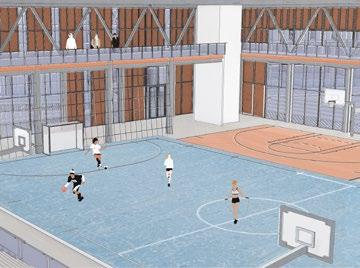


27


New Communities for the Old Salemi
Salemi, Sicily | 2019
Class: Architecture Design Studio 3
Professors: Croset Pierre-Alain, Comi Giovanni
Collaborators: Gogo Derin, Esses Marianne
The town of Salemi is an intriguing place to understand. It is the context of a formal big town in Sicily ravaged in the 20th Century by depopulation and a catastrophic earthquake. The area we were tasked with developing is situated right below the main square of the town, at the high point of the circular hill the town is built on.
The project aimed at introducing new functions and housing in one of central areas of the town while respecting the ruins of the past and the communal living that towns like Salemi were known for.

30 Masterplan
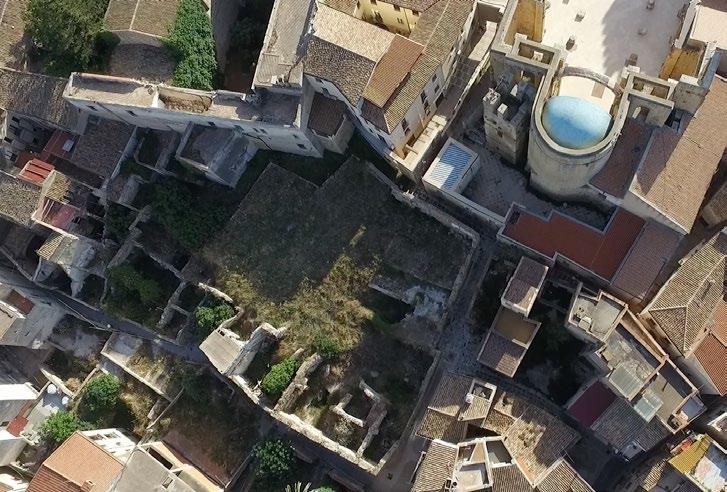

31
Functional Scheme
Aerial Site Photography
32 N N Ground Floor Plan (+427,7m) First Floor Plan (+436m)
33 N N
Second Floor Plan (+439,3m)
Third Floor Plan (+442,9m)
34 2 2 1 1 1.Old Wall (When they meet) 2.Brick Stud Wall: - 0.5cm Plaster Gypsum - 10cm Brick Veneer Wall - 2cm Air gap - 0.05cm Waterproof Membrane - 5cm Rigid Insulation - 1.25cm Fiber concrete slab - 10cm Mineral Insulation in Wool - Galvanized C profile stud - 2.5cm x2 Plasterboard - 2cm Timber Floor - 5cm Concrete Screed - 3cm Hard Iinsulation - 10cm Brick Veneer Wall - 15cm Cast Reinforced Concrete - 5.5cm Corrugated Sheet - 20cm I Steel Beam - Faux Ceiling +445.9 +442.6 +439.3 +436.0 +427.7 +445.9 +442.6 +445.9 +442.6 +445.9 +442.6 +439.3 +436.0 +427.7
Site Section
Detailed Section
Site Section
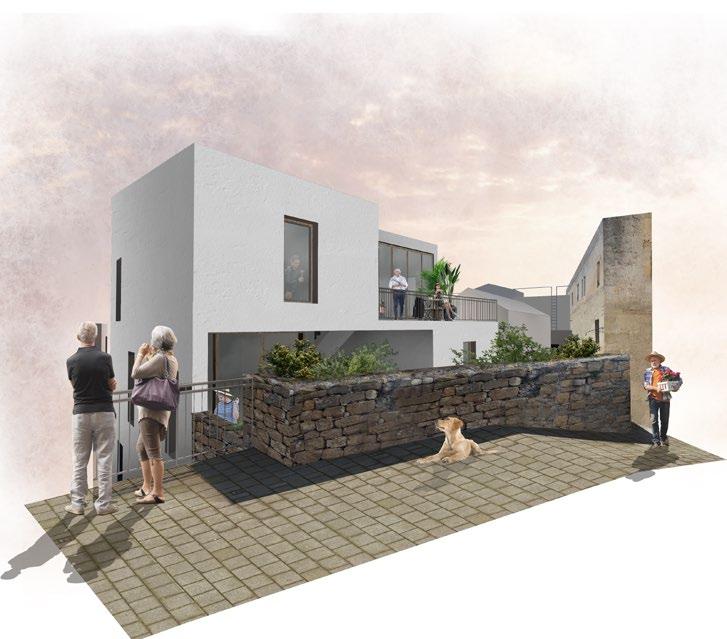

35
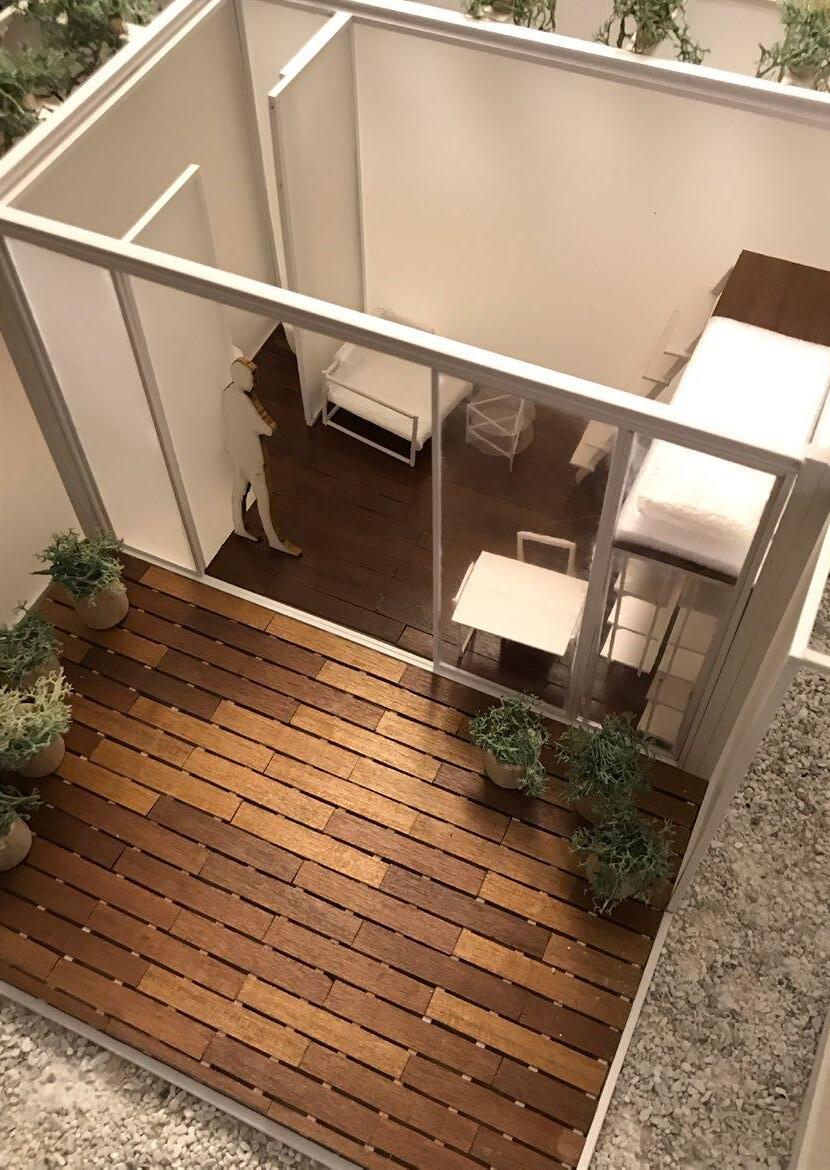
Diffused Connection
Villa Panza, Varese | 2019
Class: Interior Design Studio
Professors: Colombo Cristina, Mastromattei Antonella Yuri
Collaborators: Brugnano Francensco, Chernodrinska Sofia
This temporary pavilion was meant at housing an artist during his temporary stay, in a gallery, for the purposes of art creation. The concept was based on the idea of having the presence of the artist felt by the visitors, but also shielding them and allowing them to have a calm refuge. Accordingly, the use of layers of polycarbonate walls, created a multi-layered semi-transparent shield for the core of the small housing unit, that also included a small garden in front. The use of plants between the layers create interesting and diffused shapes of nature, between the technical layers of plastic. Ultimately, the alternating use of manufactured and natural materials aim at blending the natural and calm with the technicalities of artistic work and the temporary nature of the pavilion.
38 1:20 Ground Floor Plan 1 Section 3 Section 3 Politecnico di Milano Scuola di Arc. Urb. Cos. Academic Year 2019-2020 DIFFUSED CONNECTIONS Varese Pod | Artists in Residence INTERIOR DESIGN STUDIO Prof. A. Y. Mastromattei Prof. C. Colombo Tutors: F. D'Aloisio | V. Voltolin
39
1:20
Section A-A’ 3 1:20
04
CONNECTIONS Varese Pod Artists in Residence at Villa Panza
Section B-B’ 3
DIFFUSED
Antonis Daniil Sofia Chernodrinska Students
Atibadi Brugnano


40
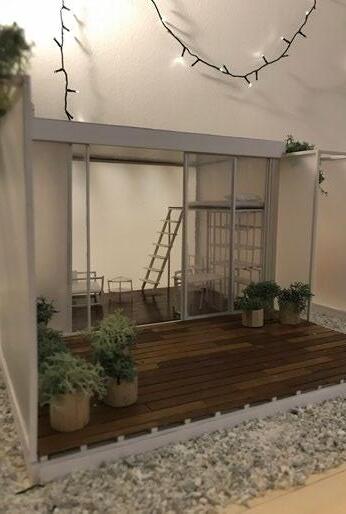
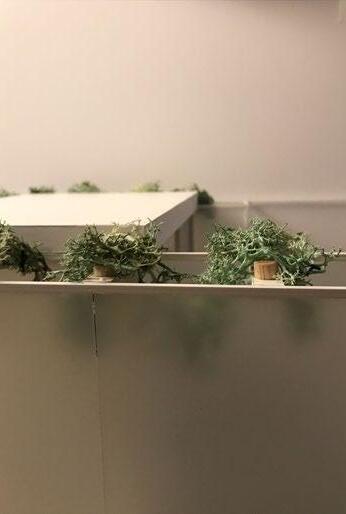

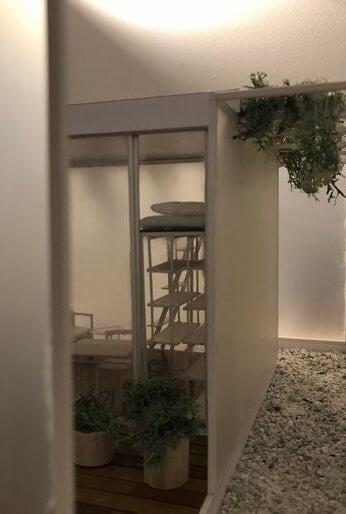
41




































































